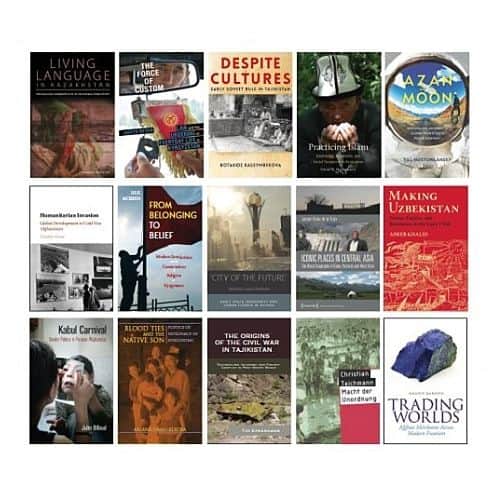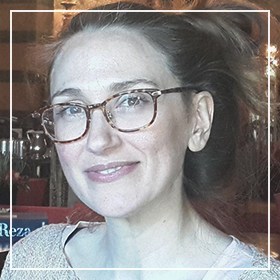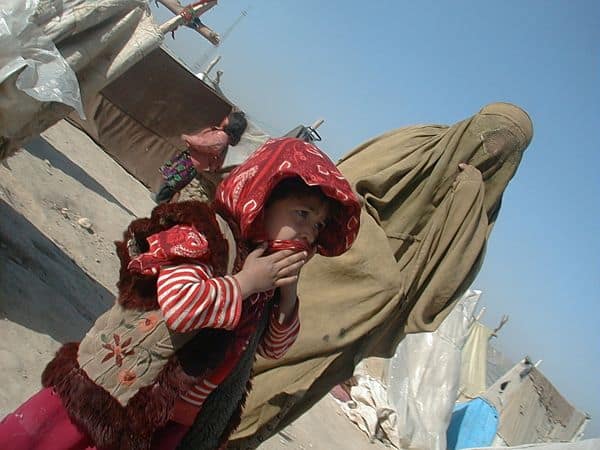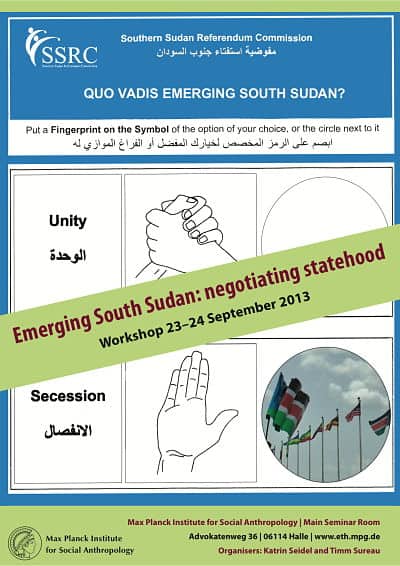The workshop “The Future of Central Asian Studies” was organized by Judith Beyer and Madeleine Reeves at the University of Konstanz and held on the 11-13th of September 2017.
The purpose of this innovative workshop format was to bring together the authors of recent monographs in the history and anthropology of Central Asia in order to encourage cross-regional and interdisciplinary conversations, and to think about how we can build from the collective insights of these works: how should we imagine our way forward in the field? Organizers Judith Beyer (University of Konstanz) and Madeleine Reeves (University of Manchester) ask: “How can material from Central Asia inform conceptual debates about order, knowledge, modernity, empire, religion and resources in the widest sense?”[1] Panels of authors read monographs by other participants in groups of three, then discussed the books together in order to draw out comparative observations and to provoke conceptual questions.
I attended this workshop as both author and reader, and was very grateful for the opportunity to read the work of my talented peers. Given the sheer volume of newly published scholarship on Central Asia in recent years, it is important to create spaces in which to critically and communally engage each of these projects. Each monograph represents years of engagement in fieldwork, archival research, writing, and revision, and it is a rare opportunity to share the results with others who have been through the same process. It is also exciting to read across the region and to explore concepts from a geographic and theoretical terrain – similar and connected, but often startlingly different – than one’s own. This blog post reflects my own subjective interpretation of some of the major topics and questions emerging from the workshop space.
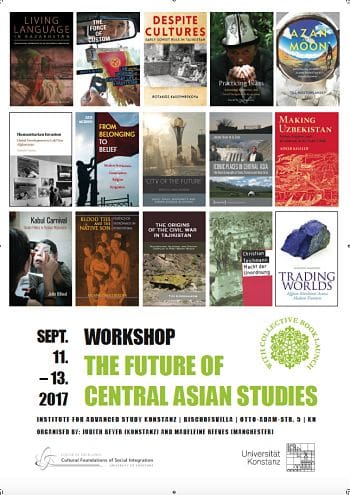 GEOGRAPHY OF ‘THE FIELD’
GEOGRAPHY OF ‘THE FIELD’
As is often the case in conversations on Central Asia, the basic question of what geographically, historically, or ethnographically constitutes our “field” was at stake in this workshop, a question that appeared over our days of conversation in many forms. Of the fourteen books we discussed, half came from contexts in Kyrgyzstan and Kazakhstan, five from Tajikistan and Afghanistan, and two from Uzbekistan.[2] None of these authors assumed or premised the frame of Soviet history or geography as a boundary for the region, unless it was explicitly a topic of analysis, for example the Soviet techniques of bureaucratic rule in Tajikistan from a personalistic perspective in Botakoz Kassymbekova’s fascinating analysis. As Jeanne Feaux de la Croix noted about her ethnographic work in Kyrgyzstan, her informants tended to reference the Soviet period in a rhetorically significant way – what is the talk of the Soviet period doing in a current ethnographic context? (My own research in Kazakhstan certainly supports this point). While we did touch upon the question of the potential overlap between ‘postsocialism’ and ‘postcolonialism’ (cf Adams 2008; Chari and Verdery 2009), as Mateusz Laszczkowski pointed out, to which imperial projects do we actually refer when using the latter term? Are we, for example, critiquing the ‘great game’ model of Central Asian history, or tracing the fracturing of a Persianate world? This is obviously critical for understanding the complicated and conflicted idea of nation-building across these spaces in the present, as well as for the inclusion of Afghanistan in a Central Asian geographic imaginary. Julie McBrien noted that in the works of Tim Epkenhans (Tajikistan), Adeeb Khalid (Uzbekistan), and Timothy Nunan (Afghanistan), the ‘nation’ is presented as a subject of contestation or ruin – as desired, thwarted, or even collapsed across the 20th century; we could compare this to the work of Julie Billaud on Afghanistan, where she presents the nation as a container of ‘carnival’ – such visions of fantasy and failure further unravel our concepts of ‘the state’ itself as well (cf Navaro-Yashin 2002; Reeves et.al. 2014). In his work on global traders, Magnus Mardsen moves away from the country itself (as well as from the war) in an effort to trace the category of ‘Afghan’ across Eurasia instead, in his mapping of trading routes across a much broader region.
GRAND NARRATIVES
Our group also made an effort to investigate the idea of ‘grand narratives’ structuring ideas of the region, which continue to be silent interlocutors, in our engagement with the field. The group was arguably most successful in displacing the tired idea of ‘tradition’ as something located outside of ‘modernity.’ For example, the books in this collective go far in their examination of political action under conditions of extreme restraint, in their complication and critique of ‘democracy,’ and in their presentation of plural rule. Aksana Ismailbekova argues that it is imperative to look at local forms of kinship and politicking, to see how strategies of patronage may actually coincide with (both fostering and shaping) elections and collective decision-making. Similarly, in my own work I have shown how ‘ancestral tradition’ is actually a contemporary means of political action and critique. Nonetheless, Mateusz Laszczkowski rightly questioned whether in our political analysis of the region, democracy is (in line with the thinking of Gayatri Spivak) something one can not want. He noted that in Timothy Nunan’s work, which presents a sustained critique of the ideologies of humanism and territorial nationalism underlying development projects in Afghanistan, democracy is perhaps most conspicuous by its absence. Christian Teichmann also picked up this line of critique, noting that we still see other grand narratives of modernity in our work, such as the idea of ‘development’ itself or the ‘enduring strain of utopias’ seen in Laszczkowski’s description of Astana city. Both within and beyond statist projects, religion itself has also been an object of both development and utopia in Central Asia: while for example it is certainly true that forms of Islam have presented a project of modernization in Central Asia alternative to Russian/European rule (as we see in the corps de travail of Adeeb Khalid), ethnographers like David Montgomery and Julie McBrien also show clearly in their work that a focus on well-being and meaning-making complicates our understanding of Islam as a category in and of itself for practioners and analysts alike, firmly intertwining emic articulation and lived traditions of ‘modernity’ or ‘tradition’ alike in another unfolding search for understanding.
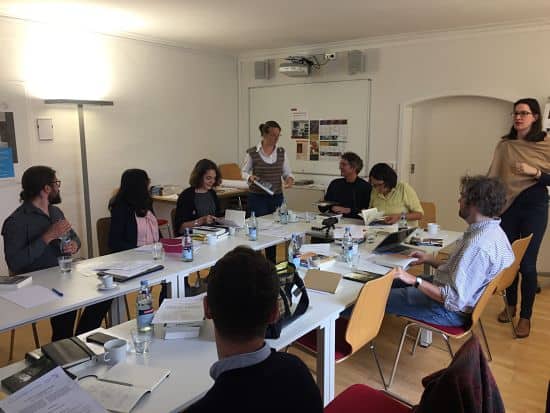
Another success of recent historical and anthropological research on Central Asia is to disrupt static understandings of ‘the state’ and ‘state rule.’ Jeanne Feaux de la Croix asked, why do we need or expect consistency from concepts like ‘the state’? Till Mostowlansky agreed, arguing that inconsistency is what we might premise more in our analysis. In his own work, Mostowlansky looked at the (post) Soviet project of modernity from the perspective of particular lives for particular purposes – ‘state-building’ it is not a linear process but a highly contingent one (cf Reeves 2014). A second and related question was that of the built infrastructure of statist projects, which reflect at once the ideologies of ‘forever’ (cf Yurchak 2005) and the realities of instability and incompleteness in the present. These ideas were also strongly echoed in the historiography of Bota Kassymbekova, Christian Teichmann and Tim Epkenhans, who all variously premise contingency in their analysis of history itself: under what conditions did a particular configuration of people, relationships, events, and structures come to be, and why? In our discussion, Teichmann reminded us further that insecurity itself can be calculated, and can produce the state effects of disorder and control. Our group also discussed the ways in which expectations of the future should also be taken seriously as a condition of the past and present, and harnessed as a way of describing society, turning the question of ‘grand narrative’ on its head as an emic form of analysis. What are we searching for, in our descriptions of life in Central Asia? As Jeanne Feaux de la Croix put it, perhaps our interest is ultimately in “a life that is more or less present, heterogeneous, and where sites of power or instutions – from ancestors to states – become more dense or more dispersed.” Madeleine Reeves similarly argued that the collective of books seem to engage the question of “what it is to live well – why might people [across Central Asia] be invested in a vision of a future or belonging somewhere.” She noted that scholars often bring to their work an agenda of ‘problem-solving’, which doesn’t always match lived reality; in our collective case, for example, the idea of joy is so central to the Central Asian experience but often gets side-lined in our analyses which, as a whole, may (over)emphasize conditions of conflict or hardship.
AUTHORSHIP AND AUDIENCES
From the perspective of authorship, an important question emerged: for whom are we writing, and why? In her comments to the authors, Judith Beyer rightly noted that even our introductory comments in monographs begin the complicated (and sometimes emotional) process of authorial positioning with regard to method, field, and potential interlocutors. Every choice we make as authors conditions the writing and ‘reading’ of our texts and, as Julie McBrien also reflected, the different theoretical ‘conversations’ of which we are part. The question of writing is an urgent and practical one; several of our discussions pivoted around the current disconnect between researchers and policy makers, the need to publish in different arenas, and to make our work accessible to different audiences in global politics. In a world where academic and policy circles are divided, where many of us feel a certain urge to be – as Julie Billaud put it – a “disturbing element” in the constant deconstruction of grand narratives, stereotypes, and misunderstandings of the region, where does our writing itself travel? As Botakoz Kassymbekova noted, ultimately we are also writing for ourselves, and for the worlds we wish to see; this is perhaps most clear in the work of Julie Billaud or Timothy Nunan, writing to combat narratives of oppression that structured a ‘humanitarian’ war in Afghanistan, or for those like Adeeb Khalid, Julie McBrien, and David Montgomery, whose research writes against false narratives of ‘Islamic extremism’ in Central Asia. If these lessons are not heard or learned, the consequences may quite literally be (continued) war.
Further, in the institutional and publication forms generated by the academy, is our work always oriented toward, for example, the United States and Europe? Our challenge is equally to work toward the dissemination of knowledge in Central Asia. Projects of translation, publication, and circulation are among the most necessary tasks, and some of the most promising avenues for these include the development of online knowledge portals and an increased engagement with online forms of knowledge and imagination coming from the region itself. The future of our field lies equally in forms of collaboration across regional and national lines and the promotion of scholarship from Central Asian colleagues, for example in the structuring of research workgroups. This raises new ethical concerns and challenges for researchers on the ground: what are the limits of collaboration, in the face of real forms of violence and suppression? Academic freedom is directly challenged in a number of locations – we could look at any number of recent examples from Russia, Central Asia, Hungary, Turkey, China, and the United States. Finally, we must also face the conditions of precariousness in global academia itself; it is simply true as the number of wonderfully qualified candidates increases, the number of available research positions is limited. How can we create more opportunities not only for the dissemination of research, but practical employment in these fields as well? The creation and protection of transnational scholarship networks is imperative: we must be mindful of one another, our colleagues, and the conditions under which we all work and live.
I would like to thank the organizers as well as all those colleagues who participated in this workshop, for all their efforts. Let’s keep writing!
Videos of the individual panels will be uploaded on Allegra shortly.
Books discussed:
Beyer, Judith. 2016. The Force of Custom: Law and the Ordering of Everyday Life in Kyrgyzstan. Pittsburgh: University of Pittsburgh Press.
Billaud, Julie. 2015. Kabul Carnival: Gender Politics in Postwar Afghanistan. Philadelphia: University of Pennsylvania Press.
Dubuisson, Eva-Marie. 2017. Living Language in Kazakhstan: The Dialogic Emergence of an Ancestral Worldview. Pittsburgh: University of Pittsburgh Press.
Epkenhans, Timothy. The Origins of the War in Tajikistan: Nationalism, Islamism, and Violent Conflict in Post-Soviet Space. Lanham, Maryland: Lexington Books.
Feaux de la Croix, Jeanne. 2016. Iconic Places in Central Asia: The Moral Geography of Dams, Pastures, and Holy Sites. Bielefeld: transcript Verlag.
Ismailbekova, Aksana. 2017. Blood Ties and the Native Son: Poetics of Patronage in Kyrgyzstan. Pittsburgh: University of Pittsburgh Press.
Kassymbekova, Botakoz. 2016. Despite Cultures: Early Soviet Rule in Tajikistan. Pittsburgh: University of Pittsburgh Press.
Khalid, Adeeb. 2015. Making Uzbekistan: Nation, Empire, and Revolution in the Early USSR. Ithaca: Cornell University Press.
Lazszkowski, Mateusz. City of the Future: Built Space, Modernity, and Urban Change in Astana. New York: Berghahn Books.
Mardsen, Magnus. 2016. Trading Worlds: Afghan Merchants Across Modern Frontiers. London: C. Hurst and Co.
McBrien, Julie. From Belonging to Belief: Modern Secularisms and the Construction of Religion in Kyrgyzstan. Pittsburgh: University of Pittsburgh Press.
Montgomery, David. Practicing Islam: Knowledge, Experience, and Social Navigation in Kyrgyzstan. Pittsburgh: University of Pittsburgh Press.
Mostowlansky, Till. Azan on the Moon: Entangling Modernity Along Tajikistan’s Pamir Highway. Pittsburgh: University of Pittsburgh Press.
Nunan, Timothy. Humanitarian Invasion: Global Development in Cold War Afghanistan. New York: Cambridge University Press.
Teichmann, Christian: Macht der Unordnung: Stalins Herrschaft in Zentralasien 1920-1950. Hamburg: Verlag des Hamburger Instituts für Sozialforschung.
Further references cited:
Adams, Laura. 2008. “Can we apply postcolonial theory to Central Eurasia?” in Central Eurasian Studies Review 7(1): 2-7.
Chari, Sharad and Katherine Verdery. 2009. “Thinking Between the Posts: Postcolonialism, Postsocialism, and Ethnography after the Cold War” in Comparative Studies in Society and History 51(01): 6-34.
Navaro-Yashin, Yael. 2002. Faces of the State: Secularism and Public Life in Turkey. Princeton: Princeton University Press.
Reeves, Madeleine. 2014. Borderwork: Spatial Lives of the State in Rural Central Asia. Ithaca: Cornell University Press.
Reeves, Madeleine, Johan Rasanayagam, and Judith Beyer, eds. Ethnographies of the State in Central Asia: Performing Politics. Bloomington: Indiana University Press.
Yurchak, Alexei. 2005. Everything Was Forever, Until It Was No More: The Last Soviet Generation. Princeton: Princeton University Press.
[1] A link to the program can be found here.
[2] Christian Teichmann’s work deals primarily with Uzbekistan from 1920-1945/50. None of the books in this groups came from Mongolia, Turkmenistan, or Xinjiang, although these would readily be included in our collective geographic imagination, and there is certainly interesting work from many colleagues happening in these locales, which is represented at the Annual Meetings of the Central Eurasian Studies Society.
This post was first published on 2 October 2017 on The CESS Blog.

